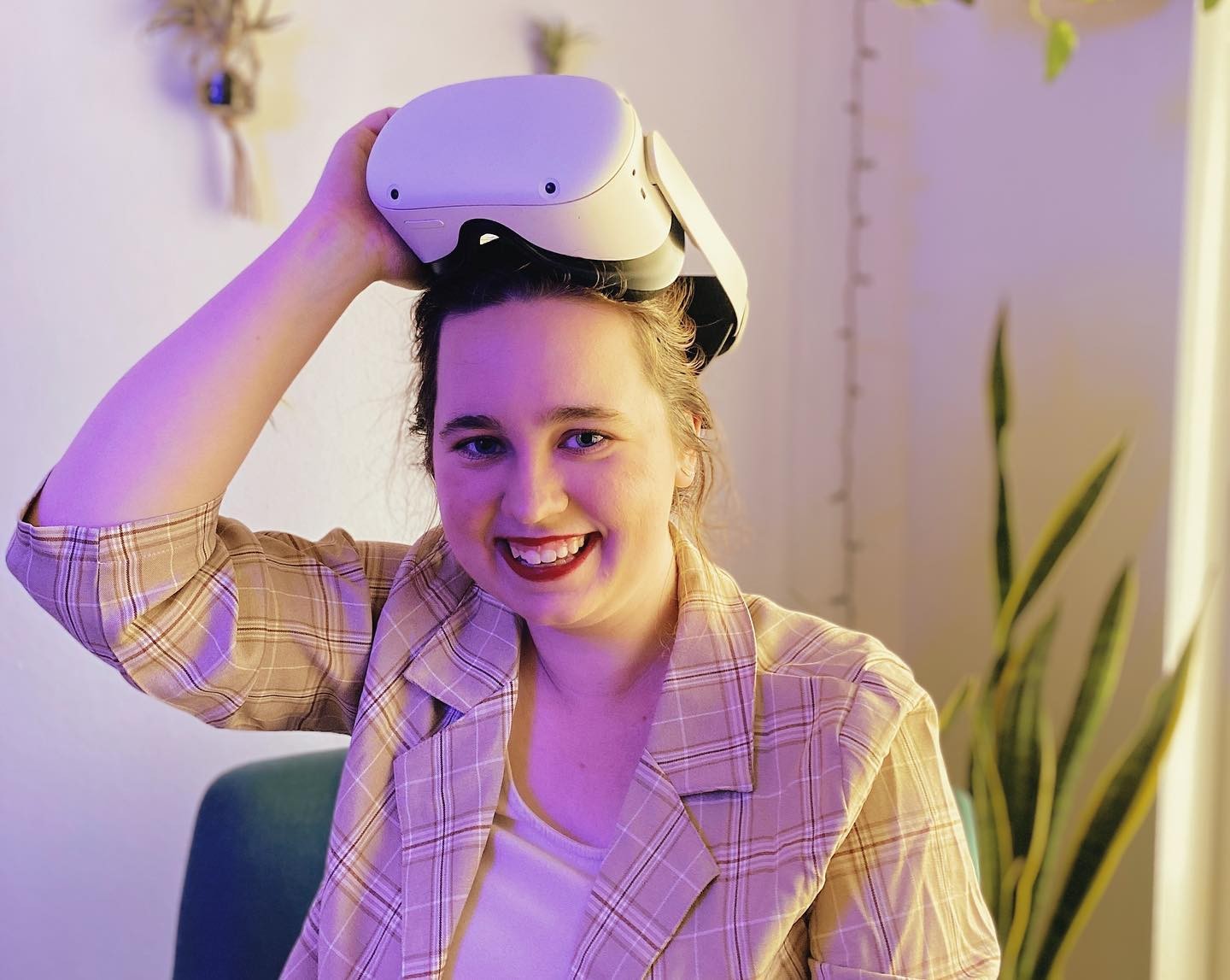
Today we’d like to introduce you to Megan Scott.
Hi Megan, so excited to have you with us today. What can you tell us about your story?
I flew from Chicago to California for film school when I was 18 thinking I’d end up as a vfx artist or even an animator. I kept to myself and thought that’s all I’d be doing. However, everything changed in the fall of 2017 when I did an internship with a small animation studio. Through the combination of the internship experience and classes at Biola University, I learned how to 3D model and make a scene in Cinema 4D that rendered out as a 360 degree video. The dean of the department saw it and said something like, “You’re doing VR. We just got some headsets, you should help set up our lab.”
The following semester, I did just that – having never done VR or even picked up a headset. My first experience in a headset was Oculus’ First Contact. I knew instantly that this was the medium I wanted to create in. I spent the semester setting up our little VR lab, giving demos to students (totaling 60+ students by the end of the semester) and hosted numerous open houses. I wanted to continue in the space, so I reached out to my art friend, Marie, and we virtually painted a world in VR using Google Tilt Brush. We didn’t know how to make an experience, let alone what software we would need. So we stuck to what we knew and made a 360 degree stop motion film called Solstice. Suddenly, I had a voice, an opportunity to lead and a way to tell a story.
That summer, I applied to Oculus Launch Pad (OLP) despite feeling crippling imposter syndrome. To my surprise, I was accepted. At this point, I was only six months into VR. My first time working in Unity, a gaming engine, was at OLP’s bootcamp at Facebook Headquarters. I finally started to find my people and they were building the things I only dreamed of. I was so inspired that I set off to make an experience of my own, this time determined to make one in a gaming engine.
Later in 2018, Marie and I saw more students gain interest, so we decided to start a VR club at Biola. By the time we graduated in May 2020, our club provided students access to the VR Lab, field trips to The Void in Downtown Disney and the ability to check out Oculus Quests that we were able to purchase with help from Biola’s Student Government. Around that time, Biola started offering gaming classes. Those classes along with many late nights teaching myself VR design taught me more about what it takes to make an experience and develop.
For my senior thesis in 2019, I pulled together a team of 30 students, alumni and industry professionals to bring my narrative experience, Avion, to life. Avion was the first interactive VR experience to be made at my university. And the first thing I’d ever develop.
Since graduating, I received a prestigious fellowship, an AR/VR Development Fellowship with the Television Academy. I formed my own company, The Present Company, which does development work in the XR space. After my fellowship with the academy, I did another fellowship with Oculus Launch Pad where my project was chosen as a grant recipient! Having my project selected for a grant was life-changing. That led me to co-found my second company, but first studio, Klexos Interactive, as well as providing an opportunity to direct, develop and innovate on my own project.
Once, I had sat quietly thinking I wasn’t capable of doing anything, feeling like an outcast amidst the sea of film people, and like I was somewhere I shouldn’t be. Now I can speak loudly. I make projects regularly and I’m growing a studio that provides a voice for the voiceless.
Can you talk to us a bit about the challenges and lessons you’ve learned along the way. Looking back would you say it’s been easy or smooth in retrospect?
I’m very grateful for the opportunities I have received, but those haven’t come without a lot of work and struggle. Before I found virtual reality and game design, every semester I thought about leaving my university. I felt like I’d made a mistake moving across the country. I moved to California because I was passionate about storytelling. Yet there was a disconnect when I started taking film classes. I felt like I didn’t square up to my peers and that I couldn’t fully communicate the stories I was trying to tell.
After I had the aha moment and found VR, that opened up a whole new realm of uncertainty. I felt like an outcast and I constantly felt defeated. I was a game designer in a program filled with film students. It made it really hard to find people to work with and led to me learning a lot on my own. I didn’t even have my own headset, let alone the knowledge to understand what I needed to learn. It felt like everywhere I looked, there was another mountain of things to learn.
The film community at my school was very supportive. Many of my peers happily took to the challenge of learning what it took to make a VR experience to help me tell a story. Oculus, as well as many of my professors and the entire crew who worked on my thesis, believed in me before I believed in myself. Sometimes you have to let others believe in you so that you can believe it for yourself.
The summer after Launch Pad in 2018, I applied to internships within VR at Sony and The Television Academy. I got to the final rounds before being told that I wasn’t quite what they were looking for. I was devastated and yet again felt like I couldn’t measure up. Everything has now come full circle, having done a fellowship with the Television Academy and finding community within games. Also, I didn’t know any other female developers, let alone any VR developers. That stoked my passion for empowering women and wanting to give more visibility to women working in games. My sister reminded me last week that struggle isn’t always bad. Struggle gives direction, stems desire for change, and builds perseverance. And makes one heck of a story.
Thanks for sharing that. So, maybe next you can tell us a bit more about your work?
I’m an XR Director and Developer meaning I help on games from idea to publishing while preserving the original vision. I have two companies; The Present Company, which does XR Development, and Klexos Interactive, a game studio. At the core of both are a shared passion for empowering women, promoting mental & emotional health, and telling impactful stories. Specifically, we are creating narrative experiences with immersive technology and encouraging others to live presently in that space.
I’m most proud of winning a grant through Oculus Launch Pad 2020 on my project Hey Pops! Which led me to co-found Klexos Interactive and is opening new doors that I never imagined. Hey Pops! Is a cooperative narrative VR experience that I’m excited to share with the world! During the experience, players step into the small town of Bluewoods past and present as siblings, Ryland and Harlee, work together to find the truth about their magician grandfather’s disappearance.
What sets me apart from others is that I’m one of the few (but growing) female developers in my space. I only know a handful of female VR developers. I also live my life differently. I don’t believe in the grind 24/7. You can still work hard and be successful without sacrificing your well-being. Sure there’s a time for crunch and late nights, but it cannot become regular. I’ve seen far too many friends burnout when they’re fresh out of the gate. I believe in taking off weekends and separating life/work when possible. You deserve to sleep and not to be stressed at your job all the time.
Is there any advice you’d like to share with our readers who might just be starting out?
My first advice would be to make yourself a priority. Learn what you need in order to be successful and how to take care of yourself. That can look like taking a mid-afternoon walk or nap or having downtime between work and sleep. I find that most people in entertainment are very passionate about what they do and work all the time. Don’t be afraid to dive in, but remember to come up for air.
On direct career advice, I’d say find a community! There are a lot of groups on Discord, Reddit, and even Facebook for different gaming and developer groups. The IGDA has great resources for finding local game developer meetups. I wish I knew earlier how okay it was that I didn’t know much. Everyone is continuously learning, and as long as you’re willing to learn, you’ll be just fine.
Contact Info:
- Email: [email protected]
- Website: https://www.thepresentcompany.co/
- Instagram: https://www.instagram.com/megansco/
- Twitter: https://twitter.com/megansco_
- Other: https://www.klexosinteractive.com/








Image Credits:
Sierra Stoltzfus



















